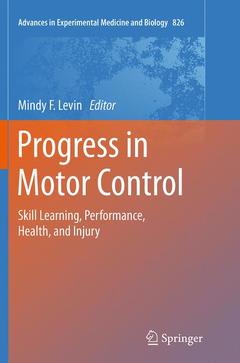Description
Progress in Motor Control, Softcover reprint of the original 1st ed. 2014
Skill Learning, Performance, Health, and Injury
Advances in Experimental Medicine and Biology Series, Vol. 826
Coordinator: Levin Mindy F.
Language: English
Subjects for Progress in Motor Control:
Progress in Motor Control
Publication date: 09-2016
Support: Print on demand
Publication date: 09-2016
Support: Print on demand
Progress in Motor Control
Publication date: 10-2014
286 p. · 15.5x23.5 cm · Hardback
Publication date: 10-2014
286 p. · 15.5x23.5 cm · Hardback
Description
/li>Contents
/li>Comment
/li>
This volume is the most recent installment of the Progress in Motor Control series. It contains contributions based on presentations by invited speakers at the Progress in Motor Control IX meeting held in at McGill University, Montreal, in July, 2013. Progress in Motor Control is the official scientific meeting of the International Society of Motor Control (ISMC). The Progress in Motor Control IXI meeting, and consequently this volume, provide a broad perspective on the latest research on motor control in humans and other species.
Introduction and Scope of the Text.- Motor Control.- Reconfiguration of the Electrical Properties of Motoneurons to Match the Diverse Demands of Motor Behavior.- The Regulation of Limb Stiffness in the Context of Locomotor Tasks.- Sub-cortical Visuomotor Control of Human Limb Movement.- Rethinking the Role of Motor Simulation in Perceptual Decisions.- Use of Uncontrolled Manifold (UCM) Approach to Understand Motor Variability, Motor Equivalence and Self-Motion.- Acquisition of Novel and Complex Motor Skills.- The Dynamical Analysis of Inter-trial Fluctuations Near Goal Equivalent Manifolds.- Motor Control in Action.- Apollo's Curse.- Motor Control in the Injured and Healthy Artist.- Adaptations to Neck/Shoulder Fatigue and Injury.- Deficits in Spatial Threshold Control of Muscle Activation as a Window for Rehabilitation After Brain Injury.- Enhancing Postural Stability and Adaptability in Multiple Sclerosis.
Written by an expert group of scientists and clinicians Wide range of theoretical, as well as actual approaches Addresses the mechanisms of typical motor control, plus deficits and disorders of movement Includes supplementary material: sn.pub/extras
© 2024 LAVOISIER S.A.S.




